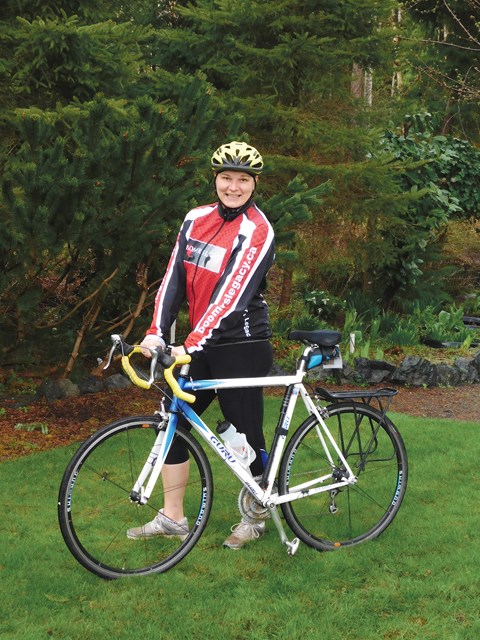Beginning June 9, 150 Canadians will pedal 600 kilometres from London, England to the Canadian National Vimy Memorial in France to commemorate the 100th anniversary of the Battle of Vimy Ridge
The goal of the ride is two-fold. To honour Canadian First World War soldiers and to raise awareness for Wounded Warriors Canada, a registered charity and fund-raising organization whose mission is to support ill and injured Canadian Armed Forces members and veterans, RCMP, First Responders and their respective families.
One of the participants will be Beverly Skwernuik who hails from Yorkton, Saskatchewan and now resides with her husband and two children on Vancouver Island.
Skwernuik’s participation in the Wounded Warriors Canada fund-raising bike event comes after many experiences with charity cycling events. As part of the Wounded Warriors ride, however, Skwernuik’s personal intention is to raise awareness about a specific illness, not just any battle injury. Her attention is on the acute symptoms of neurotoxicity after using the anti-malarial drug, mefloquine, when on military duty.
Mefloquine (also known as Lariam) has been used by Canadian military personnel since the early 1990s. Although not a military member nor has she ever served, Skwernuik experienced a close-call with Mefloquine in 1998 after being prescribed the drug while travelling to southeast Asia. Unlike Canadian soldiers who are ordered to take the drug without an alternative available, as a civilian traveler, Skwernuik had the choice to discontinue the medication as soon as she began to feel the drug’s hallucinogenic and toxic effects.
Determined to better understand what she had experienced, Skwernuik discovered reasons why the medical and research community were not willing to accept how debilitating these neurotoxic side effects are on some serving soldiers. Her journey has also led her to discover that many of Canada’s wounded veterans have been misdiagnosed with post-traumatic stress disorders (PTSD) when they should have been treated for acute mefloquine-induced neurotoxicity.
As Skwernuik explains, the chronic symptoms of mefloquine injury can mimic those associated with PTSD and may be contributing to either misdiagnoses or ineffective treatments for those permanent symptoms that last long after they discontinue the drug.
Her professional experience as an optometrist serving armed forces clientele, first in Edmonton and, more recently, in Comox, BC, coupled with her personal short-term frightening experience with mefloquine has heightened her awareness of the dangers of the drug to a point where she has become a strong advocate for Canadian veterans and their families struggling to cope with post-mefloquine mental health issues.
Skwernuik now affiliates herself with a community of like-minded activists aiming to bring greater awareness about the drug to the public, government agencies and lobbyists who can act for improving regulations. After three years working with a team of veterans, politicians, journalists, medical experts, and other advocates across Canada and internationally, Skwernuik has a far greater appreciation for veterans’ suffering and struggles.
“That struggle is real. As non-veterans, we are afraid to go into that world. It’s not our place to interfere with the affairs of military or veterans, but they do need our help,” shares Skwernuik, “With this bike ride, I want to show that we do care, Canadians care.”
While attending a Standing Committee of Veterans Affairs meeting in Ottawa in October 2016, Skwernuik met Cathay Wagantall, Yorkton - Melville Member of Parliament and deputy critic for Veterans Affairs. Wagantall is getting behind the advocacy campaign, motivated to see drastic change.
“We share a common purpose calling on the current government to apologize to the Canadian Airborne who were wrongly blamed for the Somali Affair, provide proper diagnosis and treatment for mefloquine toxicity and to only prescribe mefloquine as an anti-malaria drug of last resort with their consent and right to end its use if they so choose. We also want to remove it as an option for Canadian citizens travelling abroad,” explained Wagantall. “And because of Bev’s relentless advocacy alongside so many others last summer,
Health Canada has quietly updated the drug label adding side effects could include suicidal adulation and suicide as well as an indication that the other serious side effects could persist long after the use of the drug has stopped.”
Wagantall and Skwernuik were reunited again recently at the Sacred Heart High School 100th Anniversary celebration (Skwernuik’s alma mater).
“I enjoyed hearing her reminisce and it was clear how proud she is of this community, and cherishes her memories and the positive ways her life was influenced growing up in Yorkton,” expressed Wagantall. “I am pleased to endorse Bev’s participation in the Vimy Ridge Wounded Warrior Battlefield Ride and am thrilled that she is riding to promote mefloquine awareness. I encourage you to support Bev’s ride. Canadians need to know about the repercussions of mefloquine.”
To donate, please visit the Wounded Warrior Battlefield Bike Ride website http://woundedwarriors.ca/bbr17/, click on Sponsor a Rider, then click on Sponsor a Rider Today, and add Bev’s name, Beverly Skwernuik.




